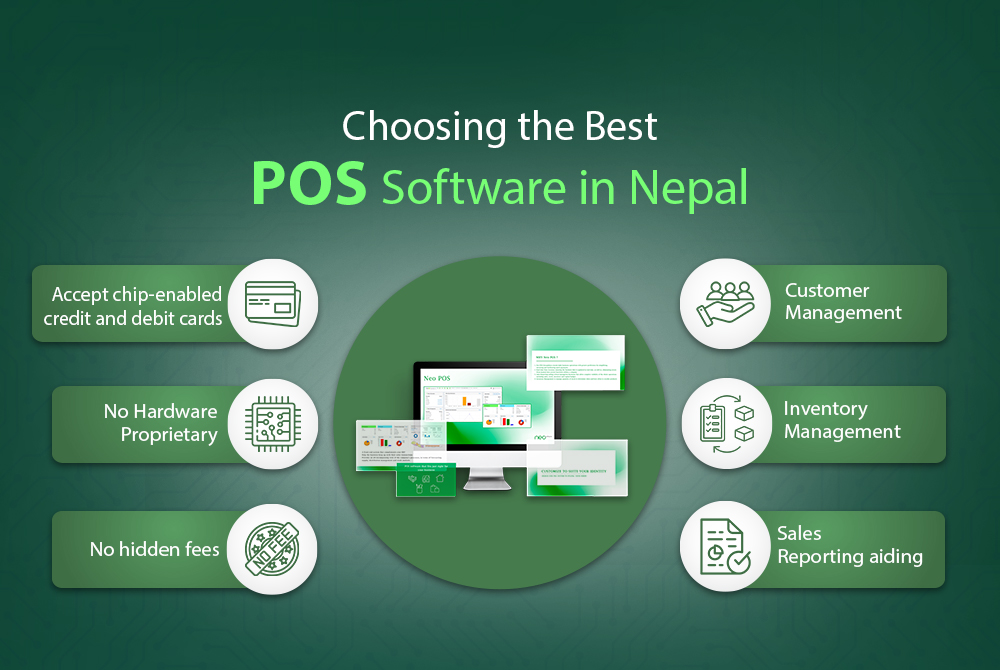
Choosing the best POS Software in Nepal
4/12/2024 12:00:00 AM
150 Views
In today's competitive business landscape, having an efficient and reliable point-of-sale (POS) system is essential for businesses across various industries. In Nepal, as the market continues to grow, it becomes crucial to choose the best POS software that suits your specific business requirements. In this blog, we will explore key factors to consider when choosing the best POS software in Nepal
7 key factors to consider when choosing POS Software in Nepal
Selecting the right POS software for your business in Nepal is a critical decision that can significantly impact your operations. Here are seven key factors to consider when choosing POS software in Nepal:
Assess Your Business Needs:
Before diving into the world of POS software, it's essential to assess your business needs and requirements. Consider factors such as the size of your business, the nature of your operations, and the specific features you require from a POS system. When choosing, think about features like keeping track of inventory, reporting sales, managing customer relationships (CRM), integration options, and how easy it is to use.
Consider Cloud-Based Solutions:
Cloud-based POS software has experienced a surge in popularity owing to its inherent advantages, including its versatility, scalability, and ease of access. With a cloud-based system, you can access your business information from any place, at any time, using any device with an internet connection. This can be particularly beneficial if you have multiple store locations or if you're frequently on the move. Additionally, cloud-based solutions often offer automatic updates, data backup, and enhanced security measures.
Look for User-Friendly Interfaces:
A user-friendly interface is crucial for ensuring a seamless checkout process and reducing training time for your staff. Look for POS software with an intuitive and easy-to-navigate interface that allows your employees to process transactions, manage inventory, and generate reports quickly. Consider whether the software offers touch-screen compatibility, shortcut keys, and customizable menus to streamline operations.
Assess Integration Capabilities:
Integration capabilities are vital for a POS system to work efficiently with other business tools and software. Consider whether the POS software integrates with popular accounting software, e-commerce platforms, payment gateways, and other essential applications specific to your business. Seamless integration eliminates the need for manual data entry and allows for accurate and real-time synchronization of information.
Analyze Customer Support and Training:
When selecting a POS software in Nepal, evaluate the level of customer support and training offered by the provider. Robust customer support ensures that any technical issues or inquiries are promptly addressed, minimizing downtime and disruption in your business operations. Look for providers that offer comprehensive training programs, video tutorials, and user manuals to ensure your staff can fully utilize the software's capabilities.
Consider Security Measures:
Security is of utmost importance when handling customer data and processing transactions. Look for POS software that incorporates robust security features, such as encrypted transactions, user access controls, and data backup and recovery options. Ensure that the software is compliant with industry standards, such as PCI DSS (Payment Card Industry Data Security Standard), to safeguard sensitive information.
Evaluate Pricing Models:
While the cost should not be the sole determining factor, it's essential to evaluate the pricing models of different POS software providers. Some providers charge a monthly subscription fee, while others offer one-time licensing costs. Consider the features and functionalities included in each pricing tier and determine which option provides the best value for your business.
Choose Neosoftware for the best POS solution
Choosing Neosoftware for the best POS solution can be a wise decision due to its robust features and user-friendly interface. Neosoftware offers comprehensive POS software in Nepal that streamlines transactions, inventory management, and reporting. Its flexibility allows customization to fit the specific needs of various businesses, ensuring a seamless integration with different industries. With a focus on reliability and efficiency, Neosoftware provides real-time analytics, helping businesses make informed decisions. The intuitive design makes it easy for staff to learn and use the system quickly, ultimately enhancing the overall customer experience. Additionally, Neosoftware often keeps up with technological advancements, ensuring that users benefit from the latest innovations in the POS industry.
FAQs
What is IRD ERP application laws?
IRD ERP application laws are the rules from the Inland Revenue Department (IRD) that govern how Enterprise Resource Planning (ERP) software is used for tasks like tax compliance, financial reporting, data protection, audits, electronic filing, and staying updated with tax law changes.
How does Neosoftware ensure compliance with IRD ERP application laws?
Neosoftware integrates features in the IRD ERP application that align with laws enforced by the Inland Revenue Department (IRD), ensuring compliance for businesses.
How does Neosoftware ensure data security within the IRD ERP application?
Neosoftware employs robust security measures, including encryption and access controls, to protect sensitive financial data stored in the IRD ERP application.
What is the IRD Tax Synchronization Process?
The IRD Tax Synchronization Process aligns financial data with IRD tax regulations, mapping transactions to codes, automating calculations, and generating compliant reports within organizational systems.
How does Neosoftware ensure accurate tax synchronization within its software?
Neosoftware's solution automatically aligns financial data with tax codes and regulations, minimizing errors and ensuring compliance with IRD requirements.
